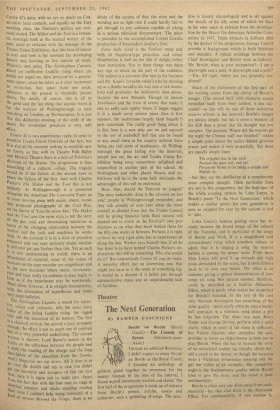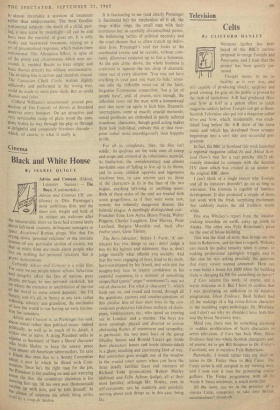Theatre
The Next Generation
By BAMBER GASCOIGNE
THOUGH an addicted Brechtian, I didn't expect to enjoy Brecht on Brecht at the Royal Court; I dreaded an anthology of gobbets glued together by reverence for the master. Instead, by the time of the interval, I found myself enormously excited and elated. The first half of the programme is made up of extracts from Brecht's poems, articles, essays and aphorism, with a sprinkling of songs. The scree-
tion is loosely chronological and is set against the details of his life, some of which we hear in his own voice in extracts from his investiga- tion by the House Un-American Activities Com- mittee in 1947. These extracts (a brilliant idea by the deviser of the programme, George Tabori) provide a background which is both hilarious and macabre. A typical exchange between the Chief Investigator and Brecht went as follows: Mr. Brecht, what is your occupation?—I am a playwright and a poet. A playwright and a poet? —Yes. All right, where are you presently em- ployed?
Much of the excitement of the first part of the evening comes from the clarity of Brecht's images. (The second half, with dramatic scenes wrenched badly from their context, is less suc- cessful—so this will be one of those notorious reviews written in the interval.) Brecht's images are always simple, but this is more a measure of his skill than a proof that his thought was not complex. The question 'Where did the masons go the night the Chinese wall was finished?' makes a simple point about the reality behind glorious events and makes it very powerfully. Yet these are equally simple lines: The crippled tree in the yard Accuses the poor soil, and yet Passers-by blame it for being a cripple and Rightly so.
—but they are the distillation of a considerably more complex thought. These particular lines are not in this programme, but the high-spot of the whole evening, spoken by Lotte Lenya, is Brecht's poem `To the Next Generation,' which makes a similar point—his own generation is seen as crippled for ever by the actions it had to take.
Lotte Lenya's famous grating voice has re- cently become the brand image of the cabaret of the Twenties, and in particular of the songs of Brecht and Weill. It is a magnificent and extraordinary voice which somehow refuses to admit that it is singing .a song. Its natural habitat is among the deeper notes. From there Miss Lenya will prod it up towards any high notes demanded by the score, but it soon slithers back to its own ease below. The effect is of someone giving a spoken demonstration of how songs are sung. Her natural manner, therefore, could be described as a built-in Alienation Effect, which is partly what makes her so perfect for Brecht's material. In the rest of the cast only Norman Rossington has something of the same quality—particularly when he uses a music- hall approach in a romantic song about a girl he has forgotten. The other two men, Barry Foster and George Devine, perform with a quiet clarity which in most of the items is sufficient; but Valerie Gearon, who completes the cast, provides at times an object-lesson in how not to play Brecht. When she has to recount the story of an unmarried mother she literally allows her- self a catch in her throat, as though the occasion were a Victorian temperance meeting and the girl the victim of an alcoholic. She completely neglects the documentary quality which Brecht tried to give the story, and the result is pure sentimentalioi.
Brecht is often only one ditch away from senti- mentality—but that vital ditch is the Alienation Effect. For sentimentality, if you analyse it,
is' almost invariably a question of treatment rather than subject-matter. The most familiar sentimental subjects—the death of a child, part- ing, a love scene by moonlight—all can be and have been the material of great art. It is only slushy and hackneyed treatment, relying on a set of preconceived responses, which makes them sentimental.- The Alienation Effect, in spite of all the pomp and circumstance which now sur- rounds it, enabled Brecht to treat simple and basic themes directly but without sentimentality. he dividing line is narrow and therefore crucial. The Caucasian Chalk Circle, written slightly differently and performed in the wrong way, could be made to seem pure slush. But so could Romeo and Juliet.
Clifford Williams's unanimously praised pro- duction of The Comedy of Errors at Stratford deserves every bouquet. On an attractive and very serviceable ramp of plain wood the com- pany frolics its way through the play as through a delightful and completely frivolous charade— Which, of course, is what it really is.











































 Previous page
Previous page